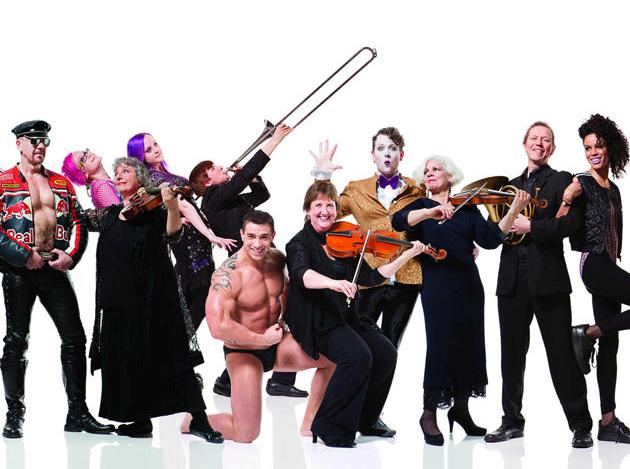You’d not expect Einstein to have daubed Amadeus’s Ninth Piano Concerto with the label “Mozart’s Eroica”. The really famous one didn’t : that piece of punditry came not from Albert the Great but Alfred the (musicologist) Lesser. Embarrassingly, the OAE’s publicity didn’t seem to know the difference. Anyway, by advertising this concert with Alfred’s tag at its head, the intention was surely to highlight the shock of the new in all three works played and/or conducted by András Schiff.
As it happened, Schiff made it all sound unshockingly natural on one level within the charmed circle of equally responsive OAE musicians. And unnatural on the other, because his “voice” was the still, small one of the fortepiano, a bit like acting Shakespeare with one’s back to the audience.
This, I have to say, is partly my prejudice, but whereas the OAE as the regent of long established period instrument bands always makes things fresher and bolder (some players pictured below for the 2013-14 season with flamboyant audience members by Eric Richmond), the fortepiano surely limits possibilities of tone and range. This one, Paul McNulty's copy of a Walter piano dating from around 1802, certainly looked handsome in walnut. But Schiff must have reasons other than historical ones for turning to this diminishing instrument when his usual modern grand can be just as nimble, quiet when needed – though not perhaps so harp-like - and never seeming to gobble up the volume in the soundboard. And that early Mozart E flat major Concerto which expands the usual scale, not least by halting the finale’s hurly-burly in mid-flow with a supernatural minuet, really needs the soloist to the fore more than the later masterpieces.
 Schiff’s preservation of shapely lines in all departments, his own included, found him jabbing or punching the air from the keyboard to his close-knit violinists – firsts and seconds to either side, which lent immediate delight to antiphonal pecking in the first ensemble – as well as conducting one right hand phrase with the left. I’m not sure the minor-key sadness of the central Andantino is really felt, though the players tried their best; it was in that novel minuet in the finale that the fledgling soul of the 21-year-old Mozart still finding his way made its mark.
Schiff’s preservation of shapely lines in all departments, his own included, found him jabbing or punching the air from the keyboard to his close-knit violinists – firsts and seconds to either side, which lent immediate delight to antiphonal pecking in the first ensemble – as well as conducting one right hand phrase with the left. I’m not sure the minor-key sadness of the central Andantino is really felt, though the players tried their best; it was in that novel minuet in the finale that the fledgling soul of the 21-year-old Mozart still finding his way made its mark.
What a difference eight years can make. The great C minor Concerto of 1785 not only still raises eyebrows at each miraculous turn, but plumbs depths of feeling in every bar. Pathos predominates, but not the tragedy “without…light relief” promised by the programme note. Schiff again made far from superficial light of it, almost like a continuo within the orchestra in the outer movements.
For Haydn, Schiff stood throughout - but batonless as well as scoreless and close to the first violins
Again, I can’t reconcile myself to the flat sound of the fortepiano in the Larghetto’s sublimely simple main theme, which Schiff kept resolutely unadorned. But the other glories here are introduced by the wind ensemble, entering and gliding out with perfect timing; as always, Schiff’s watchword seems to be “listen to each other”, and everybody did.
For this, Schiff stood as well as sat. And for Haydn, he stood throughout – but batonless as well as scoreless and close to the first violins. This interpretation of the ever unpredictable Symphony No 98 had traces of bluff humour throughout, never at any point as sober as the fanciful supposition of Haydn grieving for Mozart’s death would have us believe. The OAE has known lighter, sparkier Haydn conductors – Yannick Nézet-Séguin among them – but Schiff offered plenty of space for the special effects, including a droll embroidery of the tune we know as “God Save The Queen” by cellist Robin Michael.
Leader Alison Bury’s solo mid-finale jolted us into a different sphere again, and Haydn’s little surprise of having the violinist (originally the impresario Salomon) joined by the continuo player (probably the composer himself) revealed why Schiff had chosen this of the master’s many miraculous symphonies: he returned to the keyboard to accompany Bury bars before the end. Two stars from me for the fortepiano, but the level of musicianship was never in doubt.












Add comment